#mention of linda the lungfish
Photo


Oleander: *Listening to Drag Me Down by All Paul and dancing weird, while Raz and Linda the Lungfish are causing trouble with the boathouse on the lake near Coach Oleander's Basic Braining Classroom.*
Based on Spongebob Season 12 Episode Lighthouse Louie.
#coach oleander#morceau oleander#mention of raz#mention of linda the lungfish#mention of linda#basic braining#all paul#psychonauts#psychonauts spoilers#psychonauts in the rhombus of ruin#Ror spoilers#spongebob#funny#lol#fun#art#my art
2 notes
·
View notes
Text
I can't help but imagine Raz casually mentioning the wildest (but totally true) things in conversation with the other interns and they are always just ???? Because they cannot tell for sure if he's messing with them or that yeah, he's friends with a giant mutant lungfish named Linda.
#listen there is so much comedic potential here#they have full on conspiracy boards trying to connect all the weird stuff Raz says#trying to sus out what's real or not based who he tells what#(it's all true because that kid has seen a lot)#psychonauts#psychonauts 2#razputin aquato#psychonauts razputin
58 notes
·
View notes
Note
Similar to Cal, Linda also visits Raz. The episode takes place post-Aquanaut, and at first everyone thinks she's akumatized, but no, she's an old friend of Raz's, with him thanking her for his hero name at the end of it.
Linda stopping by for a chat is such a fun mental image
Raz mentioning a friend of his is coming by to visit and said friend is apparently a giant mutated sentient lungfish
She does prove to be a magical lady, though
14 notes
·
View notes
Text
Psychonauts: Setup and Payoff Done Well (If Not Perfectly)
So about a year ago I posted a long lecture about how Final Fantasy XV and Kingdom Hearts 3 had major problems in the story department when it came to setup and payoff. I basically said that Final Fantasy XV had lots of scenes with payoff that were not set up very well and Kingdom Hearts 3 had some excellent moments that set up story elements but never followed through on them. And while I think some of those issues have been addressed with some of the DLC released for both games (I reserve my right to be a little salty Episodes Aranea, Luna, and Noctis were canceled) I still stand by my statement that these games have big problems with this.
During the past year, I have received a couple of comments regarding my position on this, ranging from “Can you give a good example of setup and payoff?” to “Well, if you’re so smart, why don’t you come up with a better example?” And I thought, well, what kind of game would be a good example of excellent use of setup and payoff? What game or series would I say does the job so much better than any writer has or does, video game or otherwise?
And then, the middle of a repeat playthrough I always do before a game’s sequel comes out, it came to me:
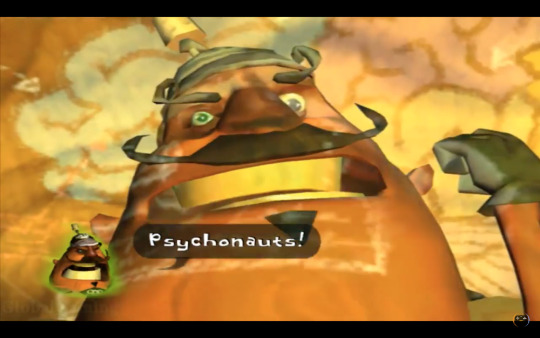
Now Psychonauts has been out since 2005, so a spoiler warning might seem a little silly here, but I think a lot of gamers have been playing it for the first time since the sequel was announced, so just in case: Major spoilers for the original Psychonauts game under the cut.
Whenever someone tries to argue whether or not video games can be considered art, one of the first games that comes to my mind is Psychonauts, and not just because of its amazing aesthetics. It has some of the best storytelling, script writing, level design, music, voice acting, and art direction I have ever seen. This game is possibly one of the best video games I have every played, despite the flaws that it does have (I’m looking at you, Meat Circus), and it is easily on my list of top ten favorite video games. Is it really any surprise that Psychonauts 2 reached its crowd-funding goal of over $3,000,000 in about a month? And yes, I admit that I am one of those backers, just to put out there any bias I know I have.
But this isn’t meant to be a review of Psychonauts.
I replayed Psychonauts a few months ago with the idea of the first game being fresh in my mind when the sequel comes out, which is supposed to be sometime this year of 2020. I was absolutely inundated with examples of effective setup and payoff as I played, so it seemed like the obvious choice to go over how this story-telling technique can be used not only well, but also to the point where it’s almost like there are far too many examples.
Honestly, I could go on and on and on about setup and payoff in Psychonauts’ story, but for our purposes here most of the focus is going to be on just three big things that are really important to the main storyline: Linda the Lungfish, bunnies and meat, and Raz’s dad.
One thing about setup and payoff is that the setup has to actually happen in a way that the audience, in this case the player, can’t miss it. There are several moments in the game that Linda is mentioned, the first time being in the opening cutscene, where Bobby teases Dogen about the monster at the bottom of the lake. You can’t miss the setup when it is thrown in your face that way.
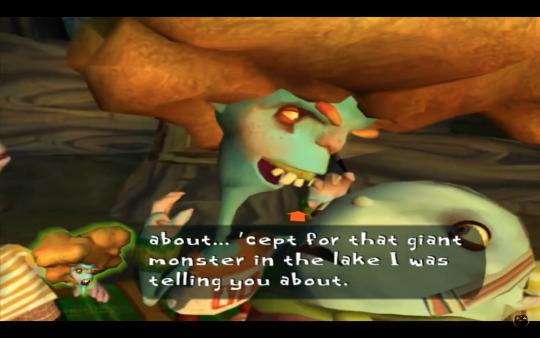
But that’s not the only time we get references to some sort of lake monster. Before going into Basic Braining, the first official level of the game, if Raz talks to Mikhail, the adorable Russian psychic mentions a “giant, hairless bear” in the woods, asking if Raz has seen it and wanting to wrestle with it. Now, it’s not said for certain if Mikhail is talking about Linda or if he’s just referring to the telekinetic bears you meet later on, but it wouldn’t surprise me at all if it’s supposed to be the former.
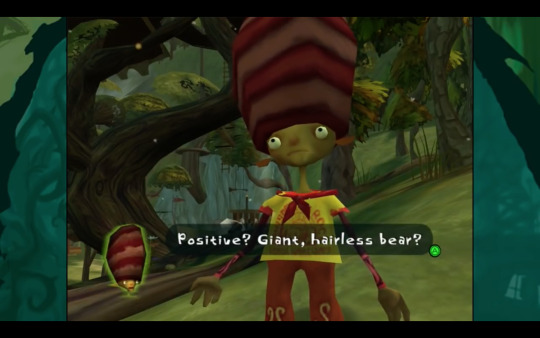
The first time the player heads for the lake, Elton will run up to Raz and mention the “brain-eating fish” that supposedly lives there. Well, now we’ve got both a mention of the lake monster and the fact that it goes after brains. Hmm, sound familiar in retrospect?
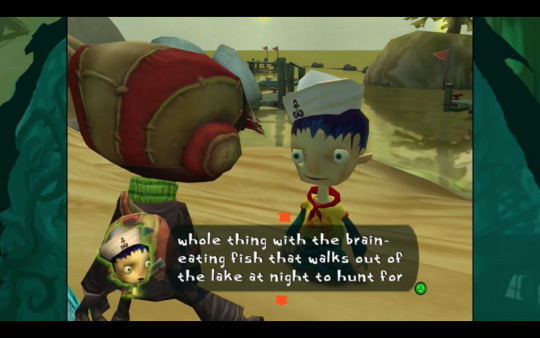
Optionally, Raz can also talk to Elton about the fish being spooked by something in the lake.
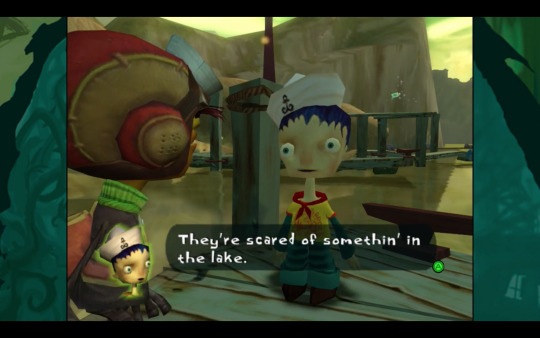
Although only the first lake interaction with Elton is mandatory (whether it’s when you go to see Milla or before then), both of these moments act as reminders of the setup of the lake monster established in the opening cutscene.
And then there’s the scene in the woods between Raz and Lili on the way to Sasha Nein’s Secret Lab. Raz says that something was watching him, a shadowy being that smelled like pond scum.
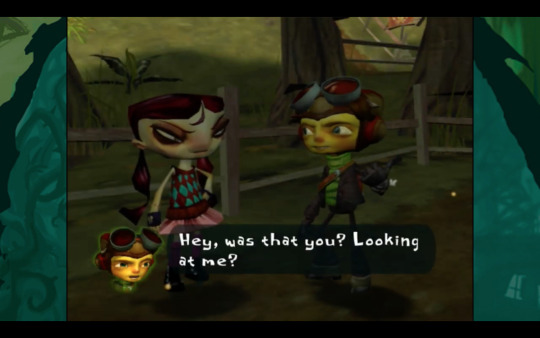
I absolutely love Lili’s face in this scene, by the way.
We kind of get distracted by their interactions and Lili basically trolling Raz, but that’s part of what makes good writing. The scene is foreshadowing something without making it overly overt…not that the game is subtle every time, but the point still stands. This game does a great mix of the obvious and the subtle.
The game also has optional dialogue with Coach Oleander and Raz reporting on a UPE (Unidentified Paranormal Entity), which he suspects is aquatic in nature. And Oleander seems oddly insistent that the lake monster does not exist, that it’s just a camp fable.
Finally we get to the Brain Tumbler Experiment. Needless to say, it’s in this level that a lot of the elements come together. We come across a demon in the form of a big, shadowy figure that spits out a diving helmet. Again, does that sound familiar at all?
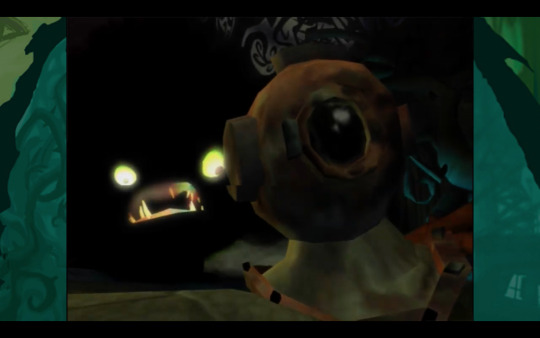
There is a minor mention of the lake monster in the mental vault below the spooky thorn tower (more on that near the end of this post), but other than that there’s a break in the game where the lake monster isn’t mentioned for a while. We don’t get another explicit scene about it until Raz and Lili meet Linda properly at the edge of Lake Oblongata…where Lili gets kidnapped, we go through the boss sequence under the lake, and enter Linda’s brain of Lungfishopolis. And the final payoff occurs with the Hideous Hulking Lungfish transporting us to Thorney Towers and giving Raz her real name, Linda.
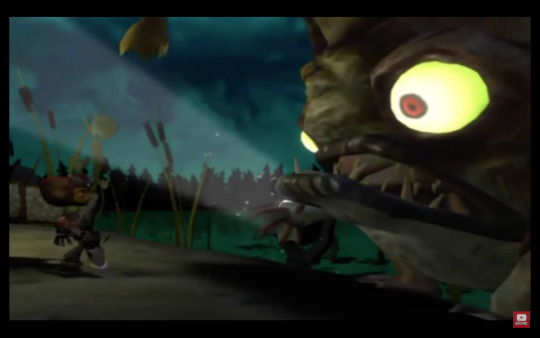
Now would any of that be nearly as rewarding if we had never heard of the Hideous Hulking Lungfish of Lake Oblongata prior to her official appearance? Every single player would just have visible question marks hanging over their heads if Linda just showed up out of nowhere. Deus Ex Lungfish, anyone? But that’s not what the developers did. They spent plenty of time building up to Linda, making her reveal not only make sense but also weaving her into the story so that her reveal is more than satisfying.
There is just one thing I’ve always been curious about, a sort of chicken-and-egg scenario. Did the legend of the lake monster start because genetically-altered Linda showed up and starting attacking campers? Or did the legend already exist and Oleander used it as an excuse to write off any “sightings” of the monster? Any ideas?
Moving on from Linda, we come to the imagery of meat and bunnies.
Without knowing the full ending of the game, most players would think that it’s a bit strange I would stick meat and bunnies together in the same category. Sadly, the connection between these things is a bit on the morose side, and they are actually first introduced at the same time as well.
When I first played Psychonauts, the first time I actively thought about bunnies and meat being related somehow was during the Brain Tumbler Experiment, but that’s actually not the first time the game introduces these. Anyone else notice that Basic Braining has figments of meat cleavers, butcher knives, a pig, a duck, and a fox? I could logic that a meat cleaver and butcher knife fit with the whole army theme, but a pig, duck and fox?
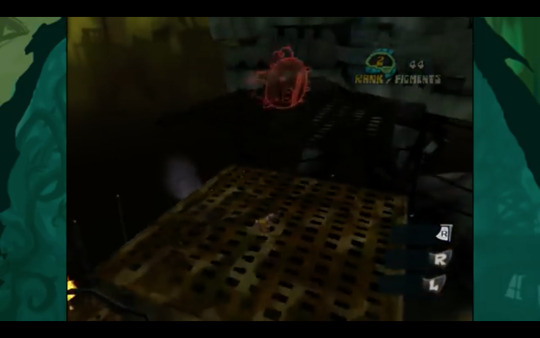
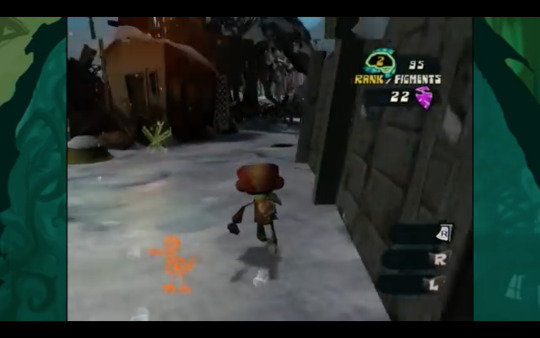
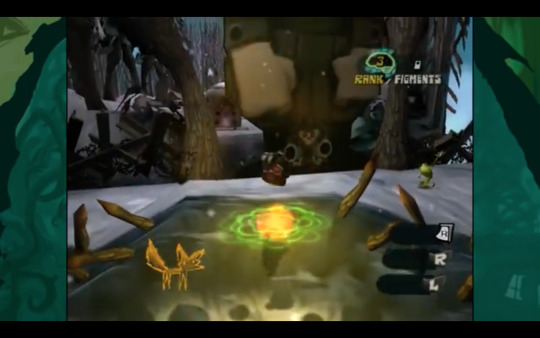
Kind of odd animals would be included in all this, especially animals that are either butchered or hunted. At least that’s what I thought at first.
It is in Oleander’s mind that we first see the “meaty plant” that Lili saves from being squashed by Raz. It’s also here that we see bunnies hopping around the snowfield with the Gatling gun. This early in the game, is this important or just set dressing? I’m ashamed to admit, but I thought it was just weird set dressing when I first played, but it makes more sense as the story goes on.
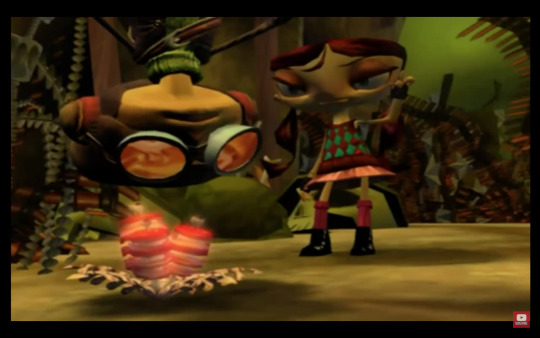
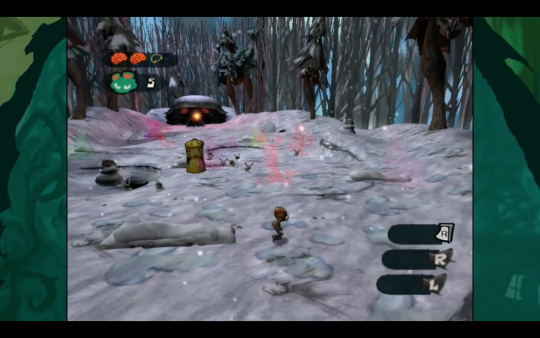
Turns out it’s important all right, since the next time we see both meat and bunnies is in the Brain Tumbler Experiment. “Mr. Bun” seems like a rather random animal to have in Raz’s brain, but then again bunnies showed up in Basic Braining as well. Is there a connection somehow? Sasha tells Raz that an animal may represent a primal fear or memory.
He’s right on the latter, although a player going through the game for the first time might not know why (and I admit, on my first playthrough, I didn’t). And there’s more meat and meaty plants here. Raz doesn’t directly mention these (at least he didn’t during my most recent playthrough, to my recollection) but they are pretty obvious, to say the least.
So that’s two things connecting the Brain Tumbler Experiment and Basic Braining. Is this a normal occurrence? Maybe these things just show up in brains? Lili does mention she had been dreaming of meat plants, after all, both in Basic Braining and in the cutscene before Raz enters Milla’s mind. Maybe it’s a primal need for meat? Don’t tell the vegans I said that. The Vegan Police would be very unhappy with the final level of this game.
After the Brain Tumbler Experiment is finished, we know that the brain interference was coming from Oleander, but it’s not explained why there are meat and bunny references up until that point. There’s actually no mention of either at all in the subsequent levels until the last. Lungfishopolis, The Milkman Conspiracy, Gloria’s Theater, Waterloo World, and Black Velvetopia are devoid of all meat or bunnies, which possibly leads the player to forget about the whole thing for a while (and when I say “the player,” I really mean me).
In fact, we don’t see any sign of either until the final level of the game, Meat Circus. And, oh boy, Meat Circus.
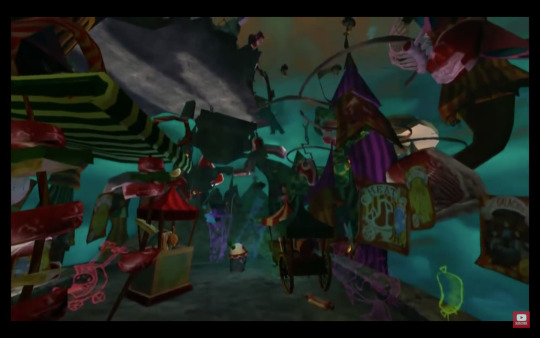
Yeah, it should come as no surprise that I hate this level. I hated it so much that on my first playthrough of this game in 2005, I rage quit and didn’t look at Psychonauts for several days. I eventually went back to it and beat it, but let’s say I was more than a little relieved that they lowered the difficulty for it in subsequent releases.
But I digress.
We reach Meat Circus, the combined consciousness of Raz and Little Oly, and the payoff of all the meat and bunny stuff we’ve seen thus far. We have Frankenstein-esque meat bunnies, platforms made of steaks, rail grinding on bones, trapeze and trampolines of bones and skin, and of course the dark versions of both Raz’s and Oleander’s fathers, who not only are evil but also become a giant two-headed monster. When Sasha said that problems seem larger in your head than in real life, I should have known it would be taken more literally in this game.
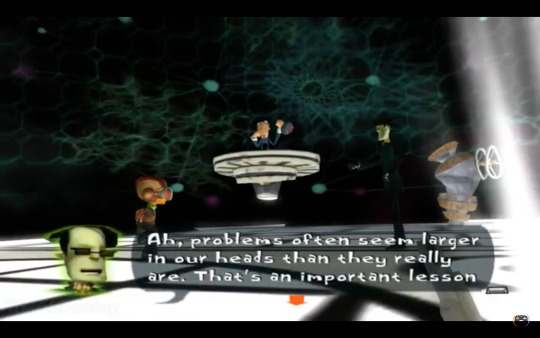
I mean, is it really any shock that Oleander is carrying some trauma after seeing his bunny friend be decapitated by his own father? It’s never said how old Little Oly is, but considering his behavior he is clearly younger than Raz, so this happened when he was in the single digits of age. That’s really not something a little kid should see. That’s just asking for PTSD.
Anyway, back to setup and payoff, which is pretty obvious at this point. We have plenty of mentions of both bunnies and meat throughout the game, leading to the final boss that is both creepy and downright terrifying. Not only does this boss conclude Oleander’s trauma with his father being a butcher and killing his favorite bunny, but it also allows Raz to defeat his inaccurate mental image of his own father. Both of them are able to move forward from that point on. Defeating this monstrosity acts as the ultimate payoff and conclusion for both Raz and Oleander.
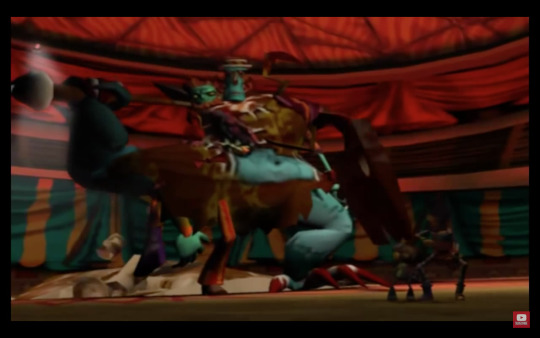
Speaking of Raz’s dad…
Raz’s relationship with his father at the start of the game is strained, to say the least. When Raz goes to learn Levitation from Milla, the very mention of his father showing up to take him home from the camp makes him nervous. Not the best sign here, and his other comments regarding his dad don’t make it much better.
Once Raz reaches cadet ranks ten and twenty, we get cutscenes of Raz talking with Cruller in tutorials for Pyrokinesis and Telekinesis. During Pyrokinesis, Raz first mentions that his father, Augustus, hates psychics and trained Raz in acrobatics to the point where Raz worried his dad was trying to kill him. During Telekinesis, Raz reveals his suspicions that his father is psychic as well. The memory vault we see of Raz running away from home only reinforces Raz’s perspective.
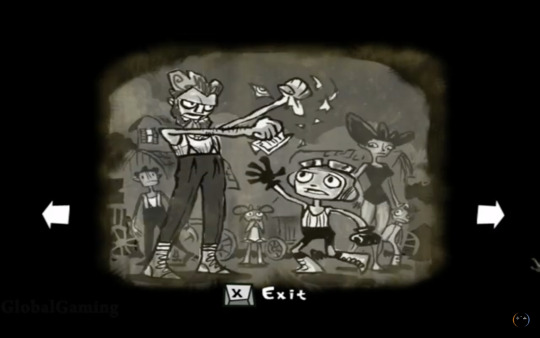
We’re led to believe that Raz’s statements are the truth, which is a logical conclusion since he’s the game’s protagonist, but the end of the game shows otherwise. At first I thought this meant Raz was simply an unreliable narrator, but that turns out to not be the whole story. While Raz is an unreliable narrator in that there are a lot of things he just doesn’t know, it’s not malicious in any way. Raz simply doesn’t know that he father really does care about him. That’s the magic of using the third-person limited point of view.
Up to this point, we’re led to believe that Augustus is a neglectful father at best, but it turns out that Augustus does love his son. He’s just apparently really bad at showing it. The very fact that he is the only one able to break into Raz’s “hard to penetrate skull” shows that there is a deeper relationship between them. And Augustus is clearly distraught that his own son sees him as a monster in his mind. Poor Augustus.
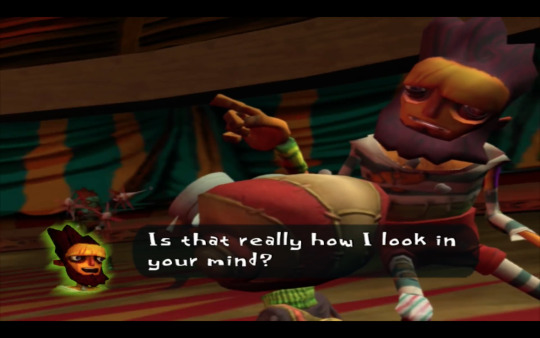
I think that a lot of the interactions between father and son in this game was cut out due to both budget and time constraints, because I feel like there is more to be said with these two than what we get in the final product. (I’m thinking we’re going to get more of that in the sequel, but that is up in the air at this time.) This doesn’t bother me too much though, since we do get effective enough setup and payoff that it doesn’t seem like it comes out of nowhere. They do finally talk to each other and express their concerns, mending their relationship…in the middle of a battle with a two-headed father monster.
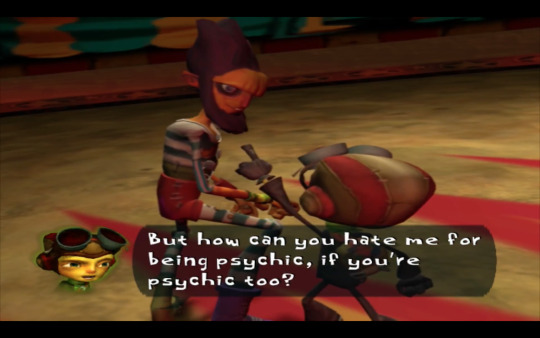
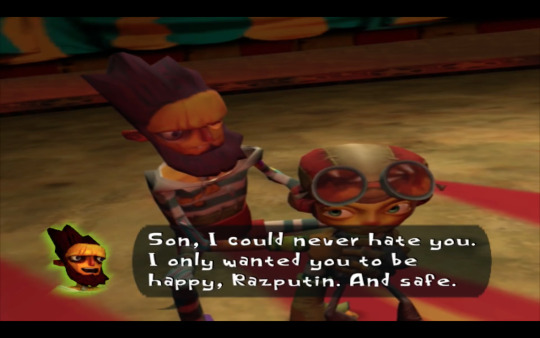
Clearly these two have communication issues. The morale of this story is that it’s important to talk to one each other.
And this is certainly paid off in the end cutscene of the game. When Sasha says they want Raz to come along to rescue Truman Zanotto, Raz doesn’t just run off with them again. He turns around and gives his father puppy-dog eyes, clearly asking for permission to go this time. And Augustus not only gives it, he gives Raz his blessing and encourages him to “show them all.” Contrast this to the backstory of the game, where Augustus flat out forbids Raz from having anything to do with the Psychonauts and Raz running away in secret.
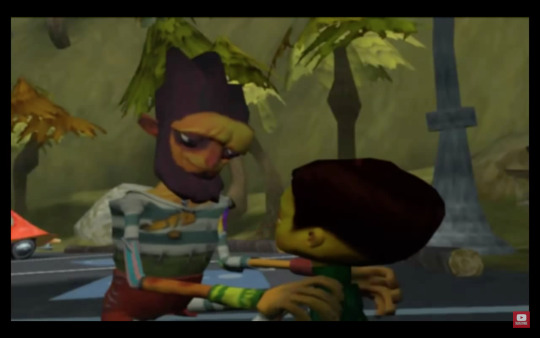
And if that’s not satisfying use of setup and payoff, I don’t know what is.
That’s not to say that all of the setup and payoff in Psychonauts is perfect. To be fair, there are times when the setup can be missed, and therefore the payoff that comes later can be confusing. The most obvious example of this is the nightmare that attacks you in The Milkman Conspiracy. When I first played the game all those years ago, my first thought was, “What in the world? What is this thing and where did it come from?”
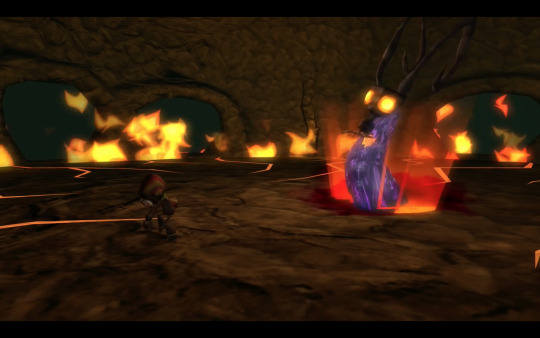
Of course, on subsequent playthroughs, I did find the demon room in Milla’s mind, showing the same nightmares she had caged away. This is the difference between a sane mind and an insane one. Milla has all her demons under control (although notice that they have not gone away) while Boyd’s run amok because he has no way of mentally dealing with them, since his brain is a little bit busy with this, well, milkman conspiracy. The nightmares that attack in Boyd’s brain make more sense after I saw the ones in Milla’s brain. In this case, the payoff wasn’t bad since the nightmare miniboss wasn’t a bad fight, but context in the form of the setup made the payoff better.
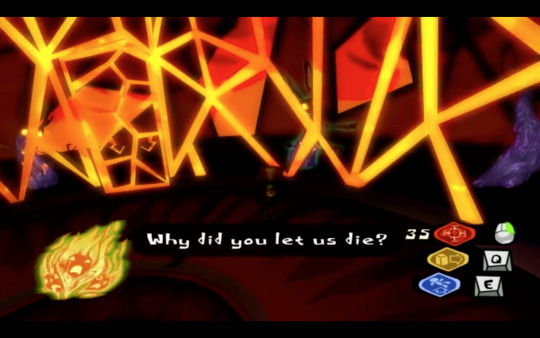
Other times the setup can be missed? The other big one is the resolution of all the campers’ storylines. Unless the player spends time going around camp throughout the game and seeing the interactions the other campers have with each other, the little scene you have with each one once they are re-brained won’t make a lot of sense. The love triangle between J.T., Elka and Nils? J.T. and Chops having conflict about J.T. abandoning his best friend for his new girlfriend? Crystal and Clem attempting suicide to become more powerful? Chloe thinking she’s an alien? Maloof basically becoming a mob leader with Mikhail as his right-hand man? Elton and Milka’s blossoming love? …Just to name a few? Yeah, the context of all that is missed if the player doesn’t bother to talk to the other campers throughout the game, but I attribute that more to the player than the game. The developers accounted for this in the story, so it’s more the player didn’t look for the setup rather than Double Fine just not bothering to include it.
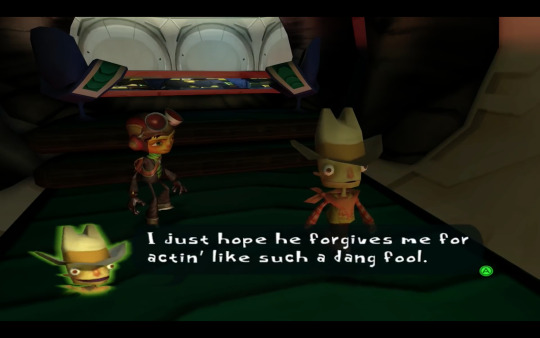
That’s just some examples of setup and payoff that I feel are probably the most important to the main storyline of Psychonauts. They are far from the only examples. Really far from it. Oh boy, could I go on about the scenarios of setup and payoff that happen in this game.
Dogen talking to the squirrels, who tell him that the short man is going to kill everyone, only for them to really be talking about Oleander?
Elton saying that Oleander’s recruiting office in Basic Braining resembles a dentist office, only to find out that one of the main antagonists, Dr. Loboto, is in fact a dentist?

Oleander having a mental vault trapped behind some mental cobwebs? Well, he has something to hide, despite him saying he doesn’t when you first play through Basic Braining. Of course, getting angry at Raz for snooping around a room with a curtain doesn’t give off the idea that Oleander has something to hide. Nope. Not suspicious at all.
Agent Crueller having all the different personalities around the camp, hinting as his unstable mental state?
The Hand of Galochio appearing in the lake as a reference to Raz’s family having a curse to die in water, and said curse just so happens to show up not only as a gameplay element but as a story element during Meat Circus?
Raz being able to read Lili’s thoughts when she doesn’t mean for him to, then for him to do it two more times near the end of the game?
How Lili’s cold stops her from sneezing out her own brain?
Sasha’s hatred of tacky lamps having to do with his past working in a tacky lamp factory? Or the shoeboxes indicating his father was a cobbler? Or the bed as the location of where his mother was horribly ill and died?
Raz needing to climb the “creepy thorn tower” in the Brain Tumbler Experiment, only to later need to climb Thorney Towers Home for the Disturbed?
The mention of the town of Shaky Claim on the giant tree stump at the camp entrance referring to the sunken town that is (somewhat) explored during the boss sequence under the lake?
Raz talking about being back in high school in Black Velvetopia despite being ten years old? Not to mention the stories the dogs tell about Lana/Lampita and Dean/Dingo?
Lastly, do I really need to mention the incredibly weird and seemingly out of place mental vault below the creepy thorn tower? A brain chicken hatches out of an egg, meets a fish in water, goes to a circus, gets placed in a teacup, and blasts people to death? Kind of a summation of Raz coming out of the egg in the Brain Tumbler Experiment, meeting Linda at Lake Oblongata, entering the Meat Circus, and getting placed in a brain tank and defeating two people? Was the mental vault a foreshadowing of the main plot of Psychonauts? I don’t know. What do you think?
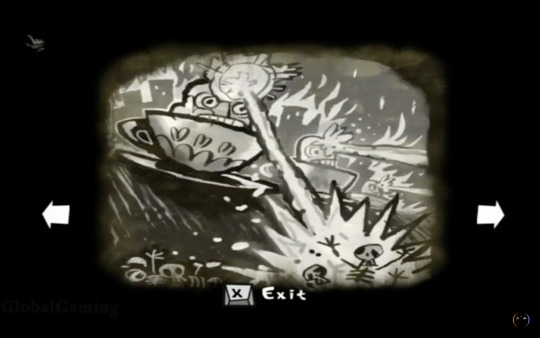
*Takes a deep breath.* See what I mean when I say I could really go on and on about setup and payoff in Psychonauts? There are so many examples that it’s kind of ridiculous. It could be said that there’s too much of this kind of storytelling in the game, but I fail to see how that is a problem. There is such a thing as too much of a good thing, but when it comes to setup and payoff, Psychonauts is not it.
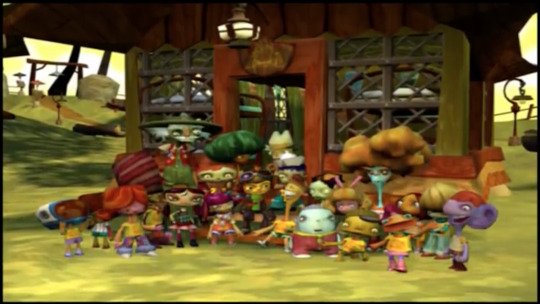
Credits
Screenshots courtesy of the following:
Comic Foil, https://www.youtube.com/channel/UCN-Y6XDe0oWyhgjcGunJqGw
Global Gaming, https://www.youtube.com/watch?v=0pjsxNSwSSA
StoryGamer, https://www.youtube.com/watch?v=ZXZ1vDFp_dw&t=139s
ThatNotSoAznKid, https://www.youtube.com/watch?v=Ford0MGvWIc
153 notes
·
View notes
Text
I wanted to practice story structure so I took the plot of Psychonauts and tried putting it in the three-act structure as outlined in this video
It was pretty fun!
--
Psychonauts- Three Act Structure
Raz’s want: To become a Psychonaut against the wishes of his father
Raz’s need: To find out what his father actually wanted all along and rekindle their relationship
ACT ONE
Backstory- Establishes status quo for protagonist, sets up the rules of the universe, and reveals some flaw or desire in the protagonist.
In the opening cutscene we learn that this world is populated by people who are psychics. We also learn that that the game is set in a summer camp that trains small children to become Psychonauts, who are secret, psychic government agents. Our introduction to Raz shows us that he sneaked in and he’s not supposed to be here, but he’s determined enough that he memorized the advertising pamphlet word-for-word and has mental shields the likes of which the adults have never seen in a child.
We also learn that his lifelong dream is to become a Psychonaut but his parent/parents disapprove of that. We’re not really introduced to any major flaws in Raz, except perhaps a touch of over-eagerness and the apparent belief that he can just break into a summer camp and be accepted in immediately (without even paying?).
Point of Attack- The event, usually out of the protagonist’s control, that kicks off the story.
It’s difficult to tell, but this could be Sasha and Oleander taking an interest in Raz, also shown in the first cutscene. Whereas Milla just wants to keep Raz safe, Sasha and Oleander want to use him for their own purposes (neither of which are made very clear here).
Inciting Incident- The protagonist’s reaction to the Point of Attack; where the conflict affects the protagonist and they have to do something. Sets up the central conflict, which is displayed through character motivation.
Because of Raz’s admirable performance in Basic Braining, Sasha invites him to come undergo some tests. Raz agrees to do this. He is motivated by a desire to get as much paranormal training as he can, secretly or not, so that he can become a Psychonaut before his dad comes to pick him up. Here is where he confronts the shadowy lungfish monster in his mind and where he learns to psi-blast, along with other skills such as pyrokinesis and telekinesis.
Lock-In- Build up of the main tension culminates in the protagonist deciding to go on their quest.
Raz makes it through his own mind only to discover a nightmare in which Dogen is having his brain stolen. After returning to the real world he discovers that the nightmare came true, and he seems to be the only one who realizes that something weird is going on. It’s up to him to try to save Dogen in his nightmare and figure out what’s going on.
ACT TWO
Milestone- Quest making some ground, culminates in the hero achieving a milestone or learning something.
Raz continues his training, learning levitation (and probably invisibility along the way) with the goal of making it to the top of the nightmare tower. Once up there he discovers what the brain is being used for—a psycho-blasting death tank.
Build-Up to Midpoint- Protagonist working toward the first serious attempt to achieve their goal.
Something sinister is definitely going on here. Raz battles the blueprint brain tank and tries to warn Sasha, only to have the older agent disregard him and leave in a hurry. Raz steals Sasha’s psycho-portal and is warned by Ford to go get Lili away from the lake.
Midpoint- Changes the aim of the hero’s quest; marks some sort of disruption.
Until now, Raz’s motivation has been to train until he becomes a Psychonaut. But suddenly Lili is kidnapped and taken into the lake. While the threat of his father coming to take him home is still there, technically, it pales in comparison to this new threat of Lili sharing Dogen’s fate. Not only that, but Raz discovers that all the kids in the camp have been de-brained, Sasha and Milla are missing and were probably captured, and Ford can’t leave his sanctuary. It’s up to Raz alone to solve the mystery of what exactly happened to everyone, get their brains back, and save Lili.
Subplot- Builds on from the change in the midpoint. Focuses on subplot, secondary characters, and/or backstory.
This is a huge chunk; the entirety of the lungfish and asylum levels. Raz begins traveling into people’s minds not to train anymore, but to overcome obstacles and, as a side-effect, actually help those whose minds he enters. He befriends Linda the lungfish and saves her from hypnosis so she’ll no longer kidnap kids. He discovers that the kids were taken to the asylum across the lake, which was foreshadowed all through act one and the beginning of act two. He helps Boyd (well, “helps”), Fred, Gloria, and Edgar, and gains access to the inside of the asylum. He makes it to the top of the highest tower and, at last, finds Lili.
Main culmination- Last sequence of the second act. Resolution of main tension. Protagonist encounters the biggest challenge yet and often ends up at their lowest point at the end of act two.
The literal “point of no return,” even indicated in the game itself.
Lili has been found, the brain-stealing operation has been uncovered, Dr. Loboto was defenestrated, and Oleander has a show-down with Sasha and Milla. Possible deus-ex machina Ford comes in with sneezing powder that he got somewhere and forces Oleander to sneeze his brain out. Raz is once again forced to face the brain tank on his own, only this time it’s not a nightmare. It’s all too real. He wins, but at the cost of sneezing out his own brain.
This is probably Raz’s lowest point in the entire game, though his emotional state doesn’t seem to be affected much beyond, “Oh, great.” However, he’s completely alone and is literally just a brain lying on the ground. His body is wandering around mindless on a small island surrounded by deep water (and not to mention dangerous rubble). His friends are all unconscious and hopefully not buried. He no longer has a concrete goal of any kind.
ACT THREE
Momentous decision- Protagonist makes a decision that creates act three’s tension, which is related to the main tension but is now different.
What could he possibly do now? If Raz throwing his own disembodied brain into the brain tank with nothing else to do counts as a momentous decision, this is it. He ends up in his own mind, as he probably expected, but there’s something strange this time. He’s not the only one here.
Twist in third act- Brings focus of the third act tension from something big and grand to something more intimate and character-oriented. Narrows or shifts the focus of the third act’s main tension.
Oleander’s mind has somehow intertwined with Raz’s, creating the horrific Meat Circus. Not only that, but the manifestation of Oleander in his own mind has regressed in age to a small child with a pet rabbit. Instead of defeating Oleander, Raz must now protect him (and himself) from the nightmare versions of both their fathers.
Climax- Resolution to final tension. Pertains to some form of character growth, addressing the flaw or desire that was shown in the first sequence.
Just when things seem to be going from bad to worse, who should show up for the first time all game but Raz’s real father? We see that the real Augustus is much different from how Raz sees him in his mind. He loves his son very much but, in trying to protect him, inadvertently ended up driving him away. Raz realizes that he might have been wrong about his father all this time and the two attempt to reforge their bond. Augustus grants Raz the power to take on the final boss and defeat it/them easily.
The two minds are separated at last. Little Oly thanks Raz for the help, and Raz has a talk with his father.
Denouement- The resolution of the story after the climax.
Just as the “backstory” at the beginning of the game was told through a cutscene, so too is the denouement. The cutscene takes place during the bright daylight whereas the game has taken place at night since near the beginning of act two, symbolizing the beginning of a new story with the dawn of a new day (though I’d say it probably takes place at least a few days later). Oleander was redeemed and seems to be forgiven in everyone’s eyes. Raz has reunited with his father. Everyone has been saved- even Ford has figured out a way to temporarily leave his sanctuary while keeping his mind.
And Raz becomes a Psychonaut at last, with the full approval of his dad, which resolves the tension that was there from the beginning.
Camp ends and the children are all sent home. At the very end of it all, Raz, Lili, Sasha, Milla, and Oleander fly off on a brand new mission together, and they wouldn’t be heard from again for twelve long years…
4 notes
·
View notes
Photo
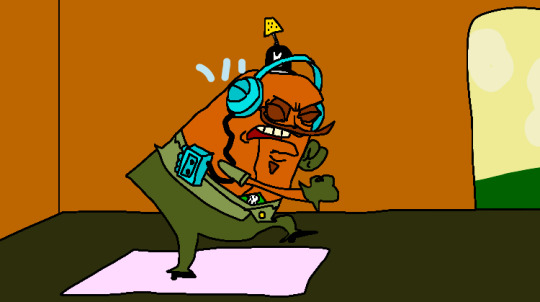
Oleander still listening to All Paul and not paying attention to the destruction of the camp and boathouse Raz is causing with Linda the Lungfish. He's just oblivious to what's going on around him. He dance to music intensely. Based on Spongebob Season 12 Episode Lighthouse Louie
#coach oleander#morceau oleander#mention of raz#mention of linda the lungfish#mention of linda#psychonauts#psychonauts spoilers#psychonauts in the rhombus of ruin#Ror spoilers#all paul#spongebob#funny#lol#fun#art#my art
3 notes
·
View notes
Photo
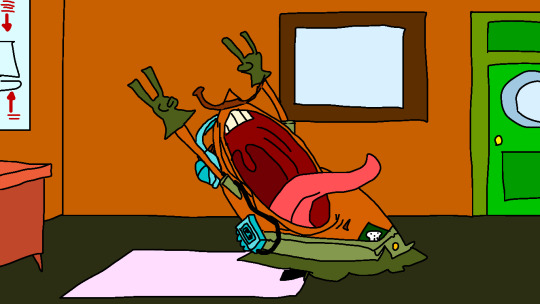
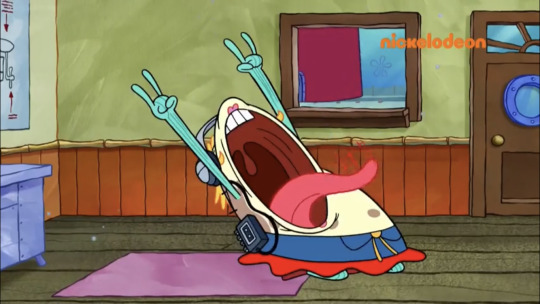
Oleander: *Listening to Drag Me Down by All Paul and does the guitar solo and stage dive like an rock star, while Raz and Linda the Lungfish are causing trouble with the boathouse on the lake near Coach Oleander's Basic Braining Classroom.*
Based on Spongebob Season 12 Episode Lighthouse Louie
#coach oleander#morceau oleander#mention of raz#mention of linda#mention of linda the lungfish#psychonauts#psychonauts spoilers#spongebob#funny#lol#fun#art#my art#all paul#basic braining
4 notes
·
View notes
Photo
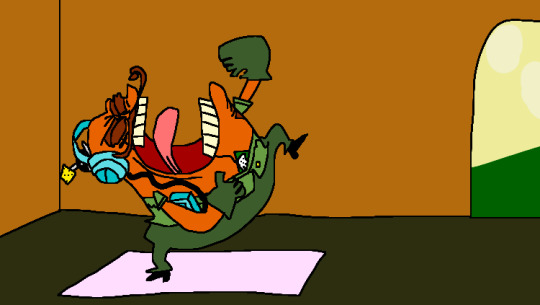
Another Oleander rocking out to All Paul Music while Raz deals with the boathouse and Linda and destruction. He crazy, but at least Raz ain't bothering him now and he gets to be free and listen to his fave boy band! Based on Spongebob Season 12 Episode Lighthouse Louie.
#coach oleander#morceau oleander#mention of linda the lungfish#mention of linda#mention of raz#psychonauts#psychonauts spoilers#funny#art#my art#fun#lol#spongebob#all paul
3 notes
·
View notes
Photo
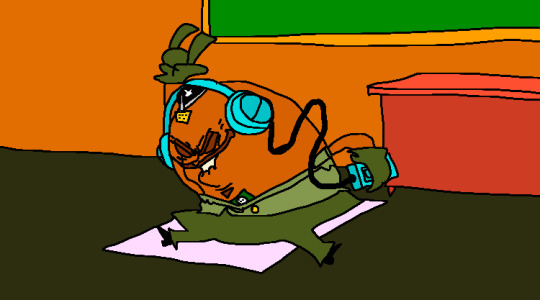
Another Oleander listens to All Paul while Raz cleans the boathouse and meets Linda the Lungfish. He be rocking' out hard. He is secluded in his classroom, minding his own business, not paying attention to what's around him. Based on Spongebob Season 12 Episode Lighthouse Louie.
#coach oleander#morceau oleander#all paul#psychonauts#psychonauts spoilers#spongebob#funny#lol#fun#art#my art#mention of raz#mention of linda the lungfish#mention of linda
2 notes
·
View notes
Photo

Oleander rocking out to All Paul to relax and be free, while Raz cleans up to boat house and sends it around the camp with Linda The Lungfish and it causes destruction with them, but Oleander is too busy rocking out to know. Based on Spongebob Season 12 Episode Lighthouse Louie.
#coach oleander#morceau oleander#psychonauts#psychonauts spoilers#mention of raz#mention of linda the lungfish#mention of linda#spongebob#funny#lol#all paul#fun#art#my art
2 notes
·
View notes
Photo
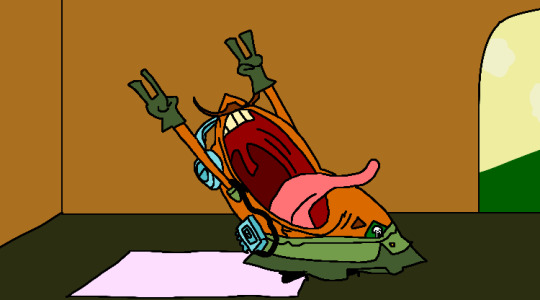
Oleander is listening to All Paul to calm himself down while Raz cleans the boathouse because he was tasked by Oleander. There's Linda The Lungfish and Raz making a lot of noise, but Oleander is oblivious due to the music. Based on Spongebob Season 12 Episode Lighthouse Louie.
#coach oleander#morceau oleander#mention of linda#mention of linda the lungfish#mention of raz#psychonauts#psychonauts spoilers#spongebob#funny#lol#fun#art#my art#all paul
2 notes
·
View notes
Photo
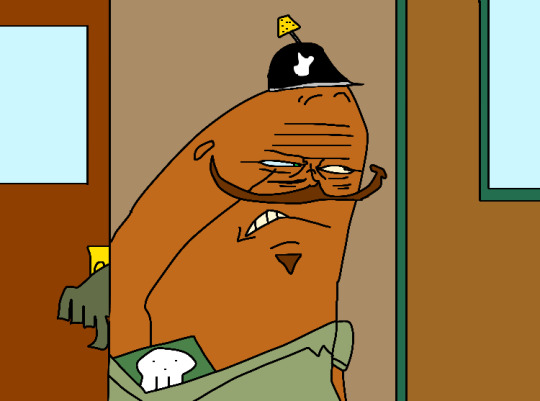
Oleander: And If you need me...Don't
Raz has made Oleander very annoyed that he makes Raz clean up the boathouse, where he finds Linda the Lungfish. Oleander doesn't want Raz to bother him. He goes to listen to All Paul Music. Based on Spongebob Season 12 episode Lighthouse Louie
#coach oleander#morceau oleander#mention of raz#mention of linda#mention of linda the lungfish#psychonauts#psychonauts spoilers#spongebob#fun#funny#lol#art#my art#he angry
1 note
·
View note
Photo
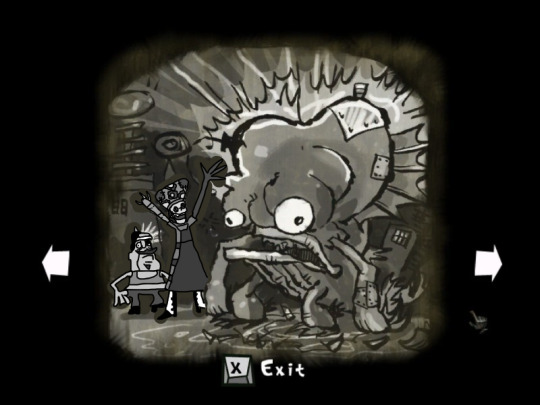
The 30 Day Psychonauts Challenge Continues on twitter :)
Day 12: Favourite Ship: Loboto and Oleander (Lobotoly) for sure because I think they are funny and I would like to see more of them in the long awaited Psychonauts 2 and Sasha and Milla and Raz and Lili of course :)
#coach oleander#morceau oleander#dr loboto#caligosto loboto#lobotoly#tagged sasha nein becuase he is mentioned#mention of Milla Vodello#tagging raz becuase his name is mentioned#mention of lili#psychonauts#psychonauts spoilers#psychonauts 2#psychonauts 2 spoilers#fun#art#my art#funny#lol#linda the lungfish#30 day psychonauts challenge
8 notes
·
View notes